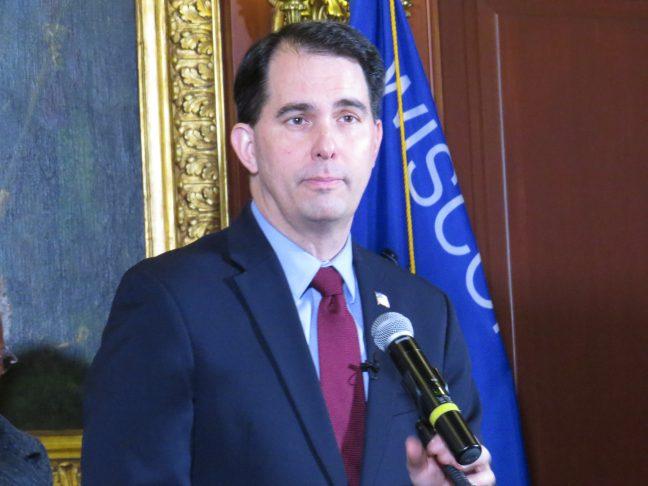In an interview on CNBC’s “Squawk Box,” Gov. Scott Walker was asked what the Republicans in the White House and Congress needed to do as they begin governing. His response was simple: It is “put up or shut up time,” just as he said six years ago to the state Legislature when he first became governor.
Republicans at the national level would greatly benefit from Walker’s model on how to govern. If you implement the reforms you stand for, then you will reap the rewards. By saying and doing what he wanted to do, Walker won three statewide elections.
During his tenure, Wisconsin has seen major successes under the Walker model.
Act 10, which limited collective bargaining to base wages and let school districts negotiate pay with individual teachers, has been the most impactful of all. Democrats and unions staunchly opposed the law, ultimately leading to the epic 2012 recall election, which brought Walker and his policies to the national stage.
A study by Stanford University economics researcher Barbara Biasi found public school districts are now able to compete for better teachers with better pay while capping the salaries of low-performing teachers. Her study examined the share of teachers who moved from a salary schedule which rewarded teachers based on seniority, to a “individual-salary” schedule, which is based on teacher performance.
The study found a 34 percent increase in the quality of teachers moving to the individual-salary districts. Simultaneously, there was a 17 percent decrease in the quality of teachers exiting individual-salary districts. Teacher workforce improvements in these districts increased student achievement.
A Milwaukee Journal Sentinel special report on Act 10 published in 2016 found the methods of firing and disciplining public school teachers is more efficient, courtesy of Act 10.
Per the report, administrators can now handle problematic teachers more quickly than in the past. The current process could take only weeks or a few months, compared to years before Act 10. The older, outdated process regularly discouraged districts from taking responsible actions.
Walker has also kept his pledge to improve the business climate in the Badger State. At his seventh State of the State speech in January, he highlighted that property taxes as a percentage of personal income are the lowest since the end of World War II.
The unemployment rate is at 3.7 percent, the lowest since 2001 and less than half of what it was when Walker became governor. With the state approaching full employment, wages are rising to new heights. From September 2015 to September 2016, overall pay for employees in the private sector increased by 7 percent.
Every election, Walker’s opponents make weak arguments to defeat him. Many love to compare Wisconsin with Minnesota, led by Democrat Mark Dayton, as an example of why Republican policies don’t work. They fail to ignore the many natural differences between the Minnesota and Wisconsin economies.
As Roger Feldman, an economics professor at the University of Minnesota, pointed out in a Star Tribune column, the two states have been on different paths since the 1960s. Wisconsin is heavily reliant on manufacturing, a sector that is increasingly competitive with the rise of globalization.
For example, Wisconsin industries in automobiles and machine tools suffered from imports coming from Germany. The Minnesotan economy is historically more diverse and has a higher share of the population with college degrees than Wisconsin does.
Data from the Bureau of Economic Analysis shows Minnesota has always had a higher GDP per capita rate than Wisconsin. Looking at unemployment data going back to 1990, our western neighbors have almost always had a lower rate than us. These differences make a comparison between the two states unfair.
Walker’s budget proposal decreases in-state tuition, raises student concerns
While the Democrats struggle to defeat state Republicans, Walker will keep on reforming. His 2017-19 budget includes the elimination of the state property tax, which the MacIver Institute reported effectively returns $180.5 million to the taxpayers. An income tax cut gives Wisconsinites another $204 million.
As for the University of Wisconsin system, the governor wants to reduce tuition for in-state students by 5 percent, saving students an average of $360 per year. There’s also an opt out for allocable segregated fees. Additionally, Walker wants UW campuses to create plans for three-year bachelor’s degrees to save students time and money.
Most importantly, the governor wants to reform welfare. Work requirements will be strengthened with the implementation of new budget, thus making it easier for people to transition away from government dependence.
Walker’s plan expands these requirements to able-bodied adults with school-age children on the state’s FoodShare program, having them work 80 hours a month or enroll in an employment training program.
According to a MacIver Institute report, the 2015 reform, which applied to able-bodied childless adults, has helped nearly 18,000 participants find employment. An extension only offers better economic results for Wisconsin.
Today, Republicans in Washington, D.C., and in other states face backlash, but they have not passed any major legislation yet. The Walker model shows why they should not back down. If Republicans do what they say they are going to do, then they will keep winning. It has worked in Wisconsin and it will work in the U.S.
John M. Graber ([email protected]) is a junior majoring in history and political science.




















